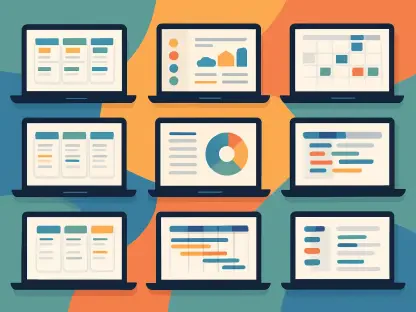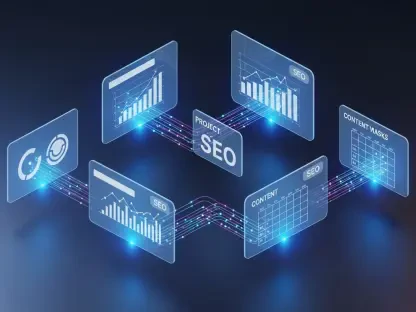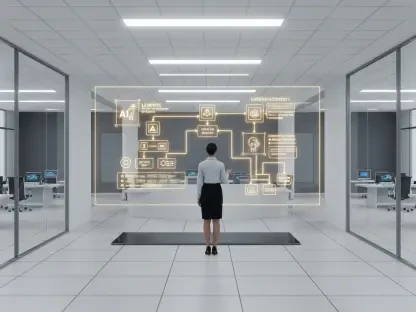Setting the Stage for Transformation in HR
Imagine a corporate world where hiring decisions are made in a fraction of the time, employee satisfaction is predicted before issues arise, and workforce planning aligns seamlessly with organizational goals. This is no longer a distant vision but a reality shaped by Artificial Intelligence (AI) in Human Resources (HR) management. As companies grapple with global instability and shrinking labor markets, AI emerges as a pivotal tool to navigate these complexities. This review delves into how AI is revolutionizing HR processes, offering a detailed exploration of its capabilities and the profound changes it brings to the corporate landscape.
The scope of this analysis covers the evolution of AI in HR, its core functionalities, recent advancements, real-world applications, inherent challenges, and future potential. By examining these facets, a comprehensive picture emerges of how AI is not just an accessory but a strategic necessity for modern workforce management. The aim is to shed light on AI’s transformative role and equip HR leaders with insights to harness its power effectively.
Evolution of AI in HR Management
The journey of AI in HR began with basic automation tools designed to handle repetitive tasks like payroll processing. Over time, these rudimentary systems evolved into sophisticated platforms powered by machine learning algorithms capable of analyzing vast datasets. This progression reflects a shift from mere efficiency to strategic foresight, enabling HR departments to anticipate needs rather than react to them.
Central to this development are principles like predictive analytics, which forecast employee turnover, and natural language processing, which interprets candidate communications. These technologies have flourished amid rapid digital transformation, where businesses increasingly rely on data-driven insights. AI’s integration into HR mirrors broader technological trends, positioning it as a cornerstone of modern organizational strategy.
As AI’s relevance grows, it intersects with business imperatives for efficiency and adaptability. Today, it stands as a driver of informed decision-making, helping HR professionals align workforce capabilities with long-term goals. This evolution underscores AI’s critical role in shaping a responsive and dynamic corporate environment.
Core Functionalities of AI in HR
Talent Acquisition and Recruitment
AI has redefined recruitment by automating labor-intensive processes such as resume screening, where algorithms filter candidates based on predefined criteria. Tools like candidate matching systems ensure alignment between job requirements and applicant skills, significantly reducing manual effort. Additionally, chatbots engage with candidates during initial interactions, providing timely responses and enhancing the applicant experience.
The impact of these tools is evident in performance metrics like reduced time-to-hire, often cutting recruitment cycles by substantial margins. Such efficiency allows HR teams to scale hiring processes without compromising quality. This capability is especially vital in competitive markets where speed in securing talent can determine organizational success.
Employee Engagement and Retention
Beyond hiring, AI plays a crucial role in gauging employee sentiment through advanced analysis of surveys and feedback. Machine learning models identify patterns in data to predict turnover risks, enabling proactive interventions. These insights empower HR to address dissatisfaction before it escalates into costly attrition.
Engagement platforms driven by AI often incorporate technical features like sentiment analysis, which interprets emotional undertones in employee communications. By fostering a deeper understanding of workplace dynamics, these tools help cultivate a supportive culture. The result is a more connected workforce, with improved morale and loyalty as tangible outcomes.
Recent Advancements in AI for HR
Innovations in AI for HR continue to push boundaries, with personalized employee experiences gaining prominence. Tailored learning paths and customized career development plans are now possible through AI systems that adapt to individual needs. These advancements mark a shift from one-size-fits-all approaches to nuanced, employee-centric strategies.
Another trend is the move away from experimental AI applications toward targeted, value-driven solutions. Organizations are focusing on measurable outcomes, such as enhanced productivity or reduced onboarding times, rather than exploratory use cases. This pragmatic approach ensures that AI investments yield concrete benefits aligned with business objectives.
Industry behavior also shapes AI adoption, as expectations for data-driven HR solutions rise. Companies increasingly demand tools that integrate seamlessly with existing systems while addressing specific pain points. This demand fuels innovation, driving vendors to develop more sophisticated and user-friendly AI applications for HR.
Real-World Applications of AI in HR
In sectors like technology and healthcare, AI is instrumental in workforce planning and performance management. Tech firms leverage AI to predict staffing needs for project cycles, while hospitals use it to optimize shift schedules amid fluctuating patient volumes. These applications demonstrate AI’s versatility across diverse operational contexts.
Notable implementations include AI-powered onboarding systems that streamline new hire integration with personalized resources. Similarly, diversity-focused hiring algorithms help organizations build inclusive teams by minimizing unconscious bias in candidate selection. Such use cases highlight AI’s capacity to address both efficiency and equity in HR practices.
Unique scenarios, such as managing remote workforces, further showcase AI’s value. With distributed teams becoming commonplace, AI tools monitor productivity and engagement across geographies. Additionally, in markets facing skills shortages, AI aids in identifying and bridging gaps through targeted training programs, ensuring workforce readiness for emerging demands.
Challenges and Limitations of AI in HR
Despite its benefits, AI in HR faces significant technical hurdles, particularly around data privacy. Ensuring compliance with regulations like GDPR while handling sensitive employee information remains a complex task. Breaches or misuse of data can erode trust, posing a substantial risk to adoption.
Algorithmic bias is another pressing concern, as AI systems may inadvertently perpetuate existing inequalities in hiring or performance evaluations. Regulatory challenges, including adherence to labor laws and ethical standards in employee monitoring, add layers of complexity. These issues necessitate robust oversight to prevent unintended consequences in decision-making processes.
Market resistance also hampers progress, with traditional HR teams often skeptical of AI’s reliability compared to human judgment. Overcoming this barrier requires ongoing training and transparent communication about AI’s capabilities and limitations. Efforts to build trust through education and pilot programs are essential to wider acceptance.
Future Outlook for AI in HR Management
Looking ahead, AI in HR holds promise for breakthroughs in personalized learning and development. Adaptive platforms could dynamically tailor training to individual skill gaps, fostering continuous growth. Such innovations could redefine how employees upskill in response to evolving industry needs.
The long-term impact of AI may extend to reshaping organizational structures, flattening hierarchies, and enhancing employee-employer collaboration. As AI automates routine tasks, HR professionals can focus on strategic roles, fostering deeper relationships within teams. This shift could herald a new era of workplace dynamics centered on human potential.
Integration with other emerging technologies, such as blockchain for secure credential verification, could further amplify AI’s role in HR. Combined with augmented reality for immersive training, these synergies might create holistic ecosystems for talent management. The potential for such convergence points to a future where HR strategies are both innovative and interconnected.
Reflecting on AI’s Journey in HR
Looking back, the exploration of AI in HR revealed a technology that fundamentally altered talent acquisition, employee engagement, and workforce planning. Its ability to streamline processes and deliver data-driven insights stood out as a game-changer for organizations navigating complex challenges. The real-world applications and recent advancements underscored a maturing landscape where AI became indispensable.
For the road ahead, HR leaders should prioritize building robust frameworks to address privacy and bias concerns, ensuring ethical deployment. Investing in training programs to familiarize teams with AI tools can dismantle resistance and foster a culture of innovation. Additionally, staying attuned to emerging integrations with other technologies will be crucial to maintaining a competitive edge in workforce management.









